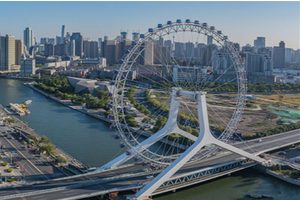Can pregnant women travel?
The best time for pregnant women to travel
The second trimester of pregnancy is about 16 ~ 28 weeks, which is most suitable for travel. At this time, even long-distance travel will not be too much problem. Because at this time, the expectant mother has adapted to the physiological changes of pregnancy, has the best physical condition, the least discomfort symptoms, and the least chance of miscarriage or premature birth.
In addition, the symptoms of early morning sickness are more obvious, and the expectant mother just needs to adapt to the fetus, and her body and mind need to be adjusted, which is not suitable for long-distance travel; Late pregnancy is not suitable for traveling, because the stomach is too big to move, so the second trimester of pregnancy is the most suitable stage for traveling abroad.
It is best to consult an obstetrician before traveling to determine whether it is suitable for traveling. In addition, pay attention to traffic safety, be sure to fasten your seat belt and be accompanied by someone. If you feel unwell, please check with your local doctor immediately. If there are factors that are not suitable for traveling, it is best not to make a trip reluctantly, so as to avoid situations during the trip.
Pregnant women who are not suitable for long-distance travel
1. Have a history of repeated abortion.
2. I was born prematurely or broke water early.
3. There have been or are currently placental abnormalities, such as placenta previa and placental abruption.
4. This pregnancy has threatened abortion or vaginal bleeding.
5. Multiple births are pregnant.
6. The fetus has intrauterine growth retardation.
7. There are diseases such as toxemia of pregnancy, hypertension or diabetes.
8, heart failure or heart valve disease.
9. There was once a vascular embolism disease.
10. Severe anemia.
11. Chronic organ dysfunction requires frequent medical treatment or long-term medication, for example, asthma.
Matters needing attention when traveling during pregnancy
1. Make a reasonable travel plan, don't be overtired, and let your body have a full rest.
Therefore, a tour group with a tight schedule is not suitable for expectant mothers, but a fixed-point travel and a semi-self-help travel mode are more suitable. In addition, you must find out the weather, traffic, medical care and social security of the tourist destination before you leave. If you are not sure, it is appropriate not to go.
2. It is not appropriate for someone to accompany the expectant mother all the way, and it is not appropriate to travel with a group of strangers.
It is best to be accompanied by someone who cares about and loves you, such as your husband, family or sister. Not only will the journey be more pleasant, but you can also take care of you when you feel tired or uncomfortable, or change your itinerary according to the situation, so that you can have a safe and happy trip.
3, the amount of exercise should not be too large or too exciting. Too much exercise may lead to miscarriage, premature birth or water breakthrough.
Activities that are too exciting or dangerous are not allowed to participate, such as roller coasters, pirate ships, free fall and bungee jumping. Swimming is not prohibited, and diving no more than 18 meters deep is also allowed, because diving more than 18 meters deep, the fetus will have "decompression sickness", which is very dangerous. Surfing and water skiing are not allowed.
4. Bring essential medicines Every traveler should prepare some medicines with him.
In addition to observing the above rules, pregnant women should also consider the safety of drugs during pregnancy, so it is very important to consult your obstetrician before leaving. In addition, it is also necessary to prepare some anti-diarrhea drugs, anti-malaria drugs and comprehensive vitamin drugs that are safe for pregnancy.
5, pregnant women travel wear, accommodation matters needing attention
Clothing: It is advisable to wear warm clothes that are convenient to put on and take off, such as hats, coats and scarves, to prevent colds. If the weather at the destination is hot, hats, sunscreen oil and lotion are indispensable. Flat shoes are more convenient than high heels. If necessary, abdomen straps and elastic socks can alleviate discomfort, and bring more paper towels and underwear for backup.
Eating: Avoid eating cold, unclean or unaccustomed food to avoid indigestion and diarrhea. Foods such as milk and seafood are perishable. If you are not sure whether they are fresh, it is advisable not to eat them. Eating more fruits can prevent dehydration and constipation, and drink more water.
Accommodation: avoid going to islands or areas with inconvenient transportation. Areas with many mosquitoes and poor sanitation are even more inaccessible, and areas where infectious diseases are prevalent should be avoided.
OK: Be sure to fasten your seat belt when taking a bus or plane. First, find out where the nearest bathroom is, because expectant mothers tend to urinate frequently, and it is no good to hold their urine at their mothers. It is best to get up and move for ten minutes every hour. Don't ride a motorcycle or speedboat. Pay attention to climbing and walking. Don't spend too much energy. Do whatever you can.
6. Make reasonable travel plans.
Even if the body is in good condition, pregnant women should not be too tired, so we must set aside enough rest time in the itinerary. In addition, you must know the weather, traffic, hospital, etc. in the arrival area before you leave. If the trip is difficult to plan and arrange and there are many uncertain factors, it is better not to go.
7. Someone should accompany you all the way.
Pregnant women should not go out alone, and it is not appropriate to keep company with a large group of strangers. It is best to be accompanied by people who know you well, such as husband, family or friends. In this way, not only will the journey be more pleasant, but when you feel tired or uncomfortable, someone will take care of you.
8. Pay more attention to food, clothing, housing and transportation.
Avoid eating cold, unclean or unhealed food, so as not to cause indigestion, diarrhea and other emergencies; Dairy products, seafood and other foods are easy to deteriorate. If you are not sure whether they are fresh, it is best not to eat them. Drink more boiled water and eat more fruits to prevent dehydration and constipation.
Clothing is mainly warm clothes that are convenient to put on and take off, and hats, coats, scarves, etc. can also be brought to prevent colds; If the weather in the area is hot, hats and sunscreen are indispensable; Flat shoes, belly straps and elastic socks can help you reduce the discomfort caused by fatigue; Bring more paper underwear for emergency.
Avoid going to islands or places with inconvenient transportation; Areas with many mosquitoes and flies and poor sanitation are not allowed to go, and areas with high incidence of infectious diseases are not suitable for pregnant women.
Be sure to fasten your seat belt when taking a car or flying, and find the location of the bathroom before taking a seat, because pregnant women urinate frequently and it is not good for pregnant women to hold their urine. It's best to get up and move for 10 minutes every hour. If it bumps badly, don't get up and stretch yourself in your seat. Don't take a motorcycle or speedboat. When climbing and walking, be careful not to spend too much energy, and do everything according to your ability.
9. Carry medicines with you.
Gastrointestinal drugs, medicinal liquid and ointment for treating trauma, band-aid, toilet water, etc., should be used first by reading the instructions of the drugs, and pay attention to whether there are words for pregnant women to use with caution.
10. Don't exercise too much or too much.
Too much exercise can easily make pregnant women's physical strength unbearable, thus leading to abortion, premature delivery and water breakthrough. High-activity activities that are too exciting or dangerous, such as roller coasters, free fall, bungee jumping, etc., are also not allowed to participate.
11. Pay attention to your physical condition at any time during the journey.
Pregnant women need to take a break if they feel tired during the trip; If you feel unwell, such as lower body bleeding, abdominal pain, abdominal distension and water breakthrough, you should seek medical advice immediately. In addition, if pregnant women have symptoms such as cold and fever, they should also see a doctor as soon as possible. In a word, don't ignore any physical symptoms and continue to travel to avoid irreparable damage.
What should pregnant women pay attention to when traveling? In the general view of many people, pregnant women are not suitable for traveling. Indeed, pregnant women are a special group, and pregnancy itself needs special care and special environment to help pregnant women ease their emotions. But it is not completely impossible to travel during pregnancy.
If expectant mothers want to travel for fun, they must avoid the first three months and the last three months of pregnancy. Because the first three and the last three are dangerous periods, the second trimester is relatively comfortable, which is more suitable for travel.
Places that pregnant women must pay attention to when traveling 1. Be fully prepared.
When a pregnant woman is ready to travel, she must do three things before leaving.
Contact the obstetrician and ask the doctor for guidance, such as what to pay attention to on the road and what to do in case of emergency? Prepare sanitary products and some commonly used medicines. You must be accompanied by at least one person on the journey. It can be taken care of very conveniently. 2. Choose transportation.
If you travel for a long time, you should choose planes, trains and ships, which are relatively stable, comfortable and safe.
3. Make a reasonable travel plan.
Be sure to make a travel plan before going out. All the aspects to be considered are listed.
4. Choose a suitable tourist destination.
It is best for pregnant women to avoid the scenic spots that need to climb. Although the scenery you will see when climbing the mountain is beautiful, if you are too tired, it will also cause certain dangers.
Remote areas or places with inconvenient transportation are not suitable for pregnant women to travel. Because of the bumpy road, it is very dangerous for Dabaobao. 5. Consider the local climate change, increase or decrease clothes in time to prevent colds.
6. Bring pregnant women's information, inspection manual and health card the day before yesterday. These are all very necessary.
If you travel in the second trimester, you can also make pregnant mothers feel better. Some precautions, pregnant women can also travel with confidence. (Image source network, if there is any infringement, contact to delete)






